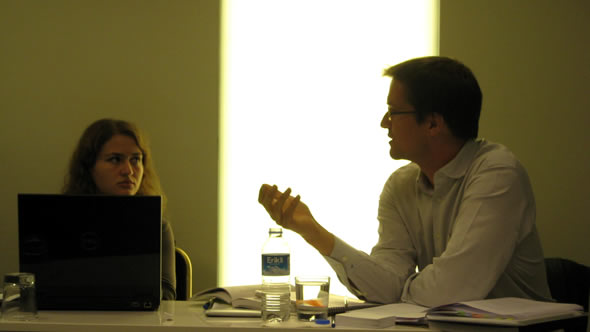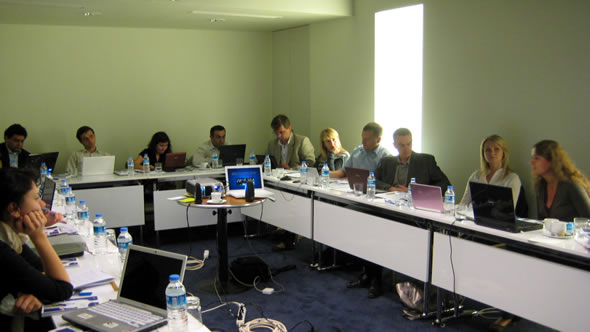ESI organises visa liberalisation seminar for analysts from Eastern Europe

On 23-25 September, ESI organised a seminar for 13 analysts from the EU's six Eastern Partnership countries that will participate in a project aimed at achieving visa-free travel for these countries. This project called "Paving the road towards visa-free travel between the Eastern Partnership countries and the EU" is supported by the PASOS network (Policy Association for an Open Society), the Local Government Initiative of the Open Society Institute and Open Society Foundations.
During the workshop, ESI analysts briefed the participants on ESI's Schengen White List Project and discussed with them specific aspects, such as monitoring of technical progress, the challenge that the implementation of the reforms present for the local governments, and political advocacy work. In addition, the situation in each EaP country was discussed in detail. The six EaP countries are Armenia, Azerbaijan, Belarus, Georgia, Moldova and Ukraine. The latter two are due to receive from the European Commission visa liberalisation action plans modelled on the visa roadmaps for the Western Balkans in the coming months.
ESI's Chairman Gerald Knaus spoke about "EU borders revolutions" that began with the Schengen Agreement: initially, a Franco-German initiative which has allowed to abolish all physical border controls in the EU without compromising its security. He said it took some EU member states a while to overcome their reservations and join the Schengen area. Now is it one of the most tangible achievements of European integration. It is time, Gerald said, to extend this achievement to the countries on the Eastern borders of the EU. A visa liberalisation process based on a set of technical criteria is a first step in that direction, he said.
Alexandra Stiglmayer, ESI Director of the Schengen White List Project, discussed with the participants the role of civil society as a "watchdog" of their governments and EU institutions, explaining which role ESI has played by ESI during the EU visa liberalisation process for the Western Balkans. She stressed that transparency of the process is vital for this and many other reasons, and that is should be a goal in itself. Most importantly, it is the precondition for a process that is strict but fair. Alexandra also spoke about ESI's approach and the outputs of the Schengen White List Project, including a rich website, detailed analyses of the state of roadmap implementation in Western Balkans countries, short "grade reports" and "scorecards" to make these analyses easy to grasp, newsletters targeting decision-makers, op-eds, open letters and public events, debates, conferences and bilateral contacts with decision-makers and the media.
Besa Shahini, ESI Senior Analyst, presented the case of Kosovo to the audience, the only Western Balkan country that has been excluded from the visa liberalisation process.
Other speakers included Jeff Lovitt, PASOS Executive Director; Irakli Rekhviashvili, LGI Project Manager and Marija Risteska, from the Centre for Research and Policy Making (CRPM) in Macedonia.
Agenda and list of participates

